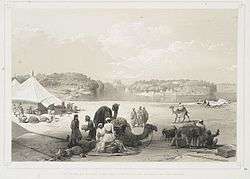Arora
The Arora is a community originating from the Punjab region of India and Pakistan. The name is derived from the place Aror (now Rohri, Pakistan) and the community comprises both Hindus and Sikhs.[2]

| Arora | |
|---|---|
| Religions | Hinduism • Sikhism |
| Languages | Punjabi • Saraiki[1] |
| Region | Primarily India and Pakistan |
| Related groups | Khatri • Bhatia • Sood |
Scott Cameron Levi, believes that they are a "sub-caste of the Khatris".[3]
Occupation and demographics
The Hoshiarpur Gazetteer says:
Before independence, the Aroras did not constitute a sizeable population in the district. With the migration of the non-Muslim population from Pakistan to India in 1947, they settled here, though in small numbers. The Aroras were generally settled in West Punjab (Pakistan) and in the Firozepur District. Their representation in the eastern districts of the Punjab was not notable. According to Ibbetson, the Aroras are the Khatris of Aror (Rori, Sukkur, Sindh, in Pakistan). Whatever be their origin, the fact is that they resemble Khatris in certain traits. They are also divided into many groups and castes, Uchanda, Nichanda, etc., but in social life, these groups are of no importance. They intermarry in their groups like others. They also intermarry among Khatris. In the All-India meeting in 1936, held by the Khatris at Lahore (Pakistan), it was decided that the Aroras, Soods and Bhatias were Khatri for all intents and purposes. And, as such, they should be admitted to the Khatri stock. This interpretation did not find much favour then, but with the lapse of time, it has almost been accepted.[4]
Before the independence, Aroras used to marry only among their sub-group i.e. Uttradhi, Dakkhna or Dahra and members of the same geographic region. But after the independence, spheres of permissible arranged matrimonial alliances were widened to others of Punjabi origin.[5]
See also
- Hinduism in Punjab
References
Citations
- "Multani language". Retrieved 22 July 2020.
- "The Oxford Dictionary of Family Names in Britain and Ireland" – via books.google.com.
- Levi (2002), p. 107
- "Chapter Iii". Archived from the original on 24 October 2010. Retrieved 21 November 2010.
- "Religions And Castes". District Gazetteer - Amritsar. Department of Revenue, Rehabilitation and Disaster Management, Government of Punjab. 1976. Archived from the original on 26 September 2007. Retrieved 23 October 2011.
Bibliography
- Levi, Scott Cameron (2002), The Indian Diaspora in Central Asia and Its Trade, 1550–1900, Leiden: BRILL, ISBN 978-90-04-12320-5, retrieved 23 October 2011